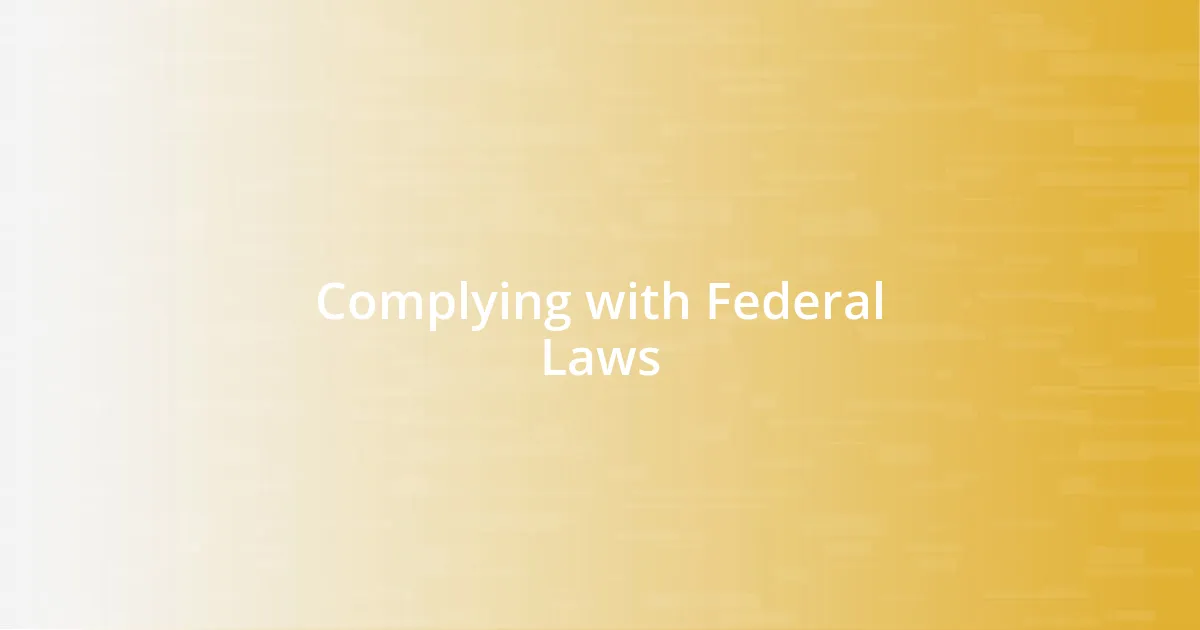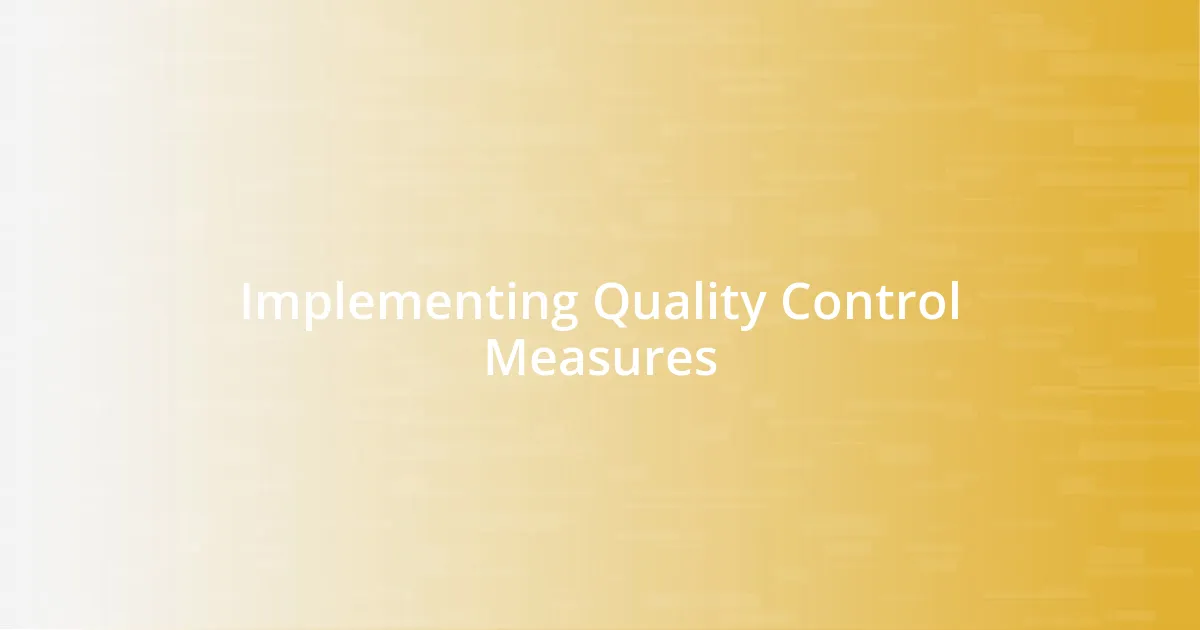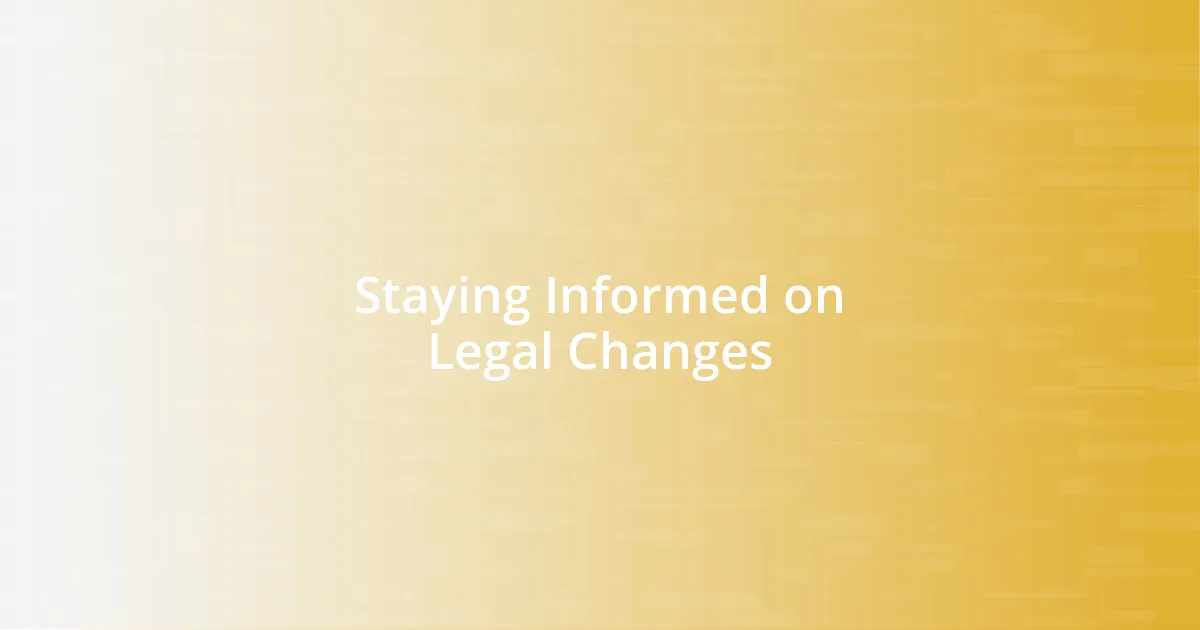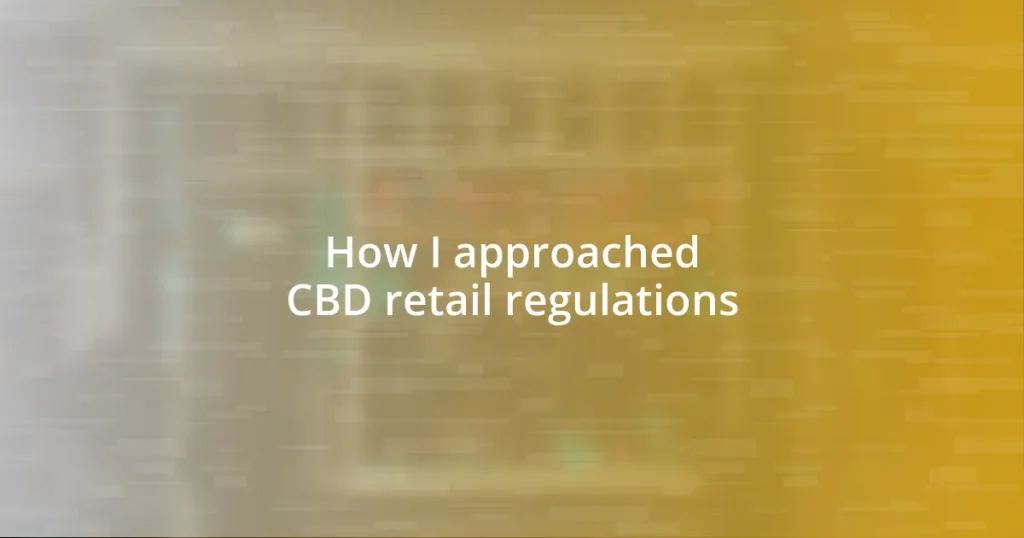Key takeaways:
- The 2018 Farm Bill legalized hemp-derived CBD federally, but compliance varies by state, necessitating local regulation awareness.
- Obtaining the correct licenses is crucial; each state has different requirements and oversights can lead to significant delays.
- Implementing strict quality control and sourcing transparency builds customer trust and ensures product safety.
- Staying informed on legal changes through networking and subscriptions helps businesses adapt proactively to industry developments.

Understanding CBD Legislation
Understanding CBD legislation can be a complex journey, especially as regulations vary significantly from one place to another. I still remember the confusion I felt when I first discovered that the legality of CBD could differ not only by state but also by the specific source of the compound—whether it was derived from hemp or marijuana. How can anyone keep track of all this?
When I dug deeper, it became clear that the 2018 Farm Bill was a pivotal moment for the CBD industry. This legislation legalized hemp-derived CBD with less than 0.3% THC on a federal level, but states still hold the power to impose their own rules. It made me realize how essential it is for CBD entrepreneurs to stay informed about local regulations; what’s allowed in one state might be completely prohibited in another.
I’ve found that connecting with local cannabis advocacy groups can be invaluable. They often help clarify the nuances of state legislation and can offer support as you navigate these complex laws. Has anyone else felt overwhelmed by the shifting legal landscape? Trust me, building a network of knowledgeable contacts is one of the best strategies I’ve used to ensure my business stays compliant.

Researching State Regulations
Navigating state regulations can feel like wandering through a maze, especially when you realize each state has its own set of rules. When I first began my journey, I spent hours scouring government websites and legal resources, only to find discrepancies and gray areas. It was frustrating, but I learned that patience and persistence are key. Investing time in research can definitely pay off in the long run.
To make this process easier, I recommend focusing on the following key strategies:
- Check Official State Websites: They often have the most accurate and up-to-date information available.
- Join Local Industry Groups: These networks can provide insights and support based on real-world experiences.
- Consult with Legal Experts: Having an attorney who specializes in cannabis law can clarify many uncertainties.
- Attend Workshops or Seminars: These events are great for in-depth learning and networking with experienced professionals.
- Keep Abreast of Updates: Laws are frequently changing, so subscribing to relevant newsletters can help you stay informed.
I remember a particularly enlightening workshop I attended, hosted by a legal consultant. It opened my eyes to the nuances of state vs. federal laws, particularly on labeling and marketing my products. I left feeling empowered and much more confident about compliance, knowing I could apply that knowledge to my own business practices.

Obtaining Necessary Licenses
Obtaining the necessary licenses to operate a CBD business can certainly feel daunting. I recall the day I received my first license—it was a mix of excitement and anxiety. Each state has its own licensing requirements, and it’s crucial to follow them closely. Some states may require a standard business license, while others may ask for specific cannabis-related permits. Missing one detail can lead to costly setbacks.
As I gathered the required paperwork, I realized how important it was to double-check everything. For instance, I had submitted my application without a mandatory inspection certificate. It was such a simple oversight, but it delayed my approval by weeks. This experience taught me to create a checklist for each state’s requirements and ensure I have all documentation prepared and organized. Trust me; this proactive approach not only expedites the process but also reduces stress.
I found that reaching out to state agencies directly can offer clarifications and guidance. The representatives were often willing to assist and provide additional resources. They can give insights about what licenses are essential for my specific business model. Was it just me, or did anyone else feel like they were about to dive into a legal thriller? In the end, making those connections became invaluable in my pursuit to remain compliant and gain the confidence to forge ahead in this evolving industry.
| State | Required Licenses |
|---|---|
| California | Cannabis Business License |
| Florida | Medical Marijuana Treatment Center License |
| Texas | Hemp Grower License |
| Illinois | Adult Use Cannabis Business License |

Complying with Federal Laws
Complying with federal laws is an essential step for any CBD business, as the legal landscape can be quite intricate. I remember the weight of uncertainty I felt when I learned about the 2018 Farm Bill, which legalized hemp-derived CBD at the federal level. It was a relief, but I quickly realized that compliance goes beyond just understanding the landmark legislation; it involves meticulously adhering to specific federal guidelines.
One key aspect I had to consider was the THC content in my products. Under federal law, hemp-derived products must contain less than 0.3% THC. I found myself scrutinizing every batch, ensuring it met this requirement. My heart raced during the initial lab tests—would my products pass? Fortunately, they did, but it was a reminder that strict adherence to these regulations is not just about legality; it’s about ensuring consumer safety and earning trust.
I also learned the importance of documenting everything. It may sound tedious, but maintaining accurate records of sourcing and testing was invaluable. I recall a moment when I had to trace back my supply chain for an audit—it was a daunting task, but I felt a surge of pride knowing that I was prepared. Isn’t it reassuring to know that every effort you put into compliance can pave the way for a successful business in a still-developing market? Keeping up with federal compliance not only helps protect my business but also contributes to the overall legitimacy of the CBD industry.

Implementing Quality Control Measures
Implementing effective quality control measures is a cornerstone of establishing a reputable CBD business. I remember when I first started sourcing raw materials, and I was overwhelmed by the variety of suppliers. After reviewing several options, I realized that not all were created equal. It became clear to me that only partnering with trusted suppliers who provided third-party lab results would ensure the potency and purity of my products. How could I expect my customers to trust my brand if I didn’t scrutinize what went into it?
Once I started with quality control, I set up a regular schedule for testing each batch. I vividly recall the first time a batch failed quality tests; I felt a pang of disappointment, yet it acted as a wake-up call. It pushed me to analyze the entire production process meticulously. Now, I always correlate lab results with specific batches, ensuring traceability. Keeping this meticulous record not only helps me maintain compliance but also reassures my customers that they are receiving a safe, high-quality product.
Engaging directly with my testing laboratories also brought an unexpected benefit. I opened a dialogue with them, asking questions about methodologies and results. This interaction allowed me to learn more about common pitfalls in testing and manufacturing. It was like uncovering layers of knowledge; every conversation sparked new insights. Can you imagine the difference it made in improving my quality control protocols? By being proactive in my approach, I felt empowered and more confident about my products.

Staying Informed on Legal Changes
Staying updated on legal changes is an ongoing journey that I learned to embrace. I often found myself checking the news and monitoring legal updates specifically related to the CBD industry. It might seem tedious to some, but I considered it essential—like tending to a plant that requires constant care. Have you ever experienced that moment when a new regulation could change everything? I recall when I discovered a proposed amendment that could potentially impact our labeling requirements. That day, I made it a priority to adjust my business strategies accordingly, ensuring I wouldn’t be caught off guard.
Another effective method I adopted was networking with other CBD entrepreneurs and industry groups. I remember attending a local CBD conference where legal experts spoke about recent developments. Engaging in those sessions opened my eyes to nuances I hadn’t considered before. Isn’t it amazing how a single conversation can lead to new insights? Those connections fostered a shared understanding of the legal landscape, making compliance a collective responsibility rather than a solitary task. I always left those meetings feeling more equipped and less anxious about the future.
Moreover, I set up alerts and subscribed to industry newsletters to keep me in the loop. The moment I received an email about a potential legal change, I would gather my team for a meeting. I felt a sense of urgency mingled with determination each time we discussed these updates. It wasn’t just about compliance; it was about staying ahead of the curve. Have you thought about how a proactive approach to legal changes could benefit your business? For me, it transformed potential anxiety into a proactive strategy, positioning my business as a leader in a rapidly evolving market.

Building a Responsible Business Model
Building a responsible business model in the CBD industry requires me to prioritize ethical practices at every level. I still remember a pivotal moment when I realized that transparency wasn’t just a buzzword; it was my foundation. By clearly communicating sourcing practices and production processes, I established trust with my customers. Can you grasp the difference it can make when consumers feel empowered by understanding where their products come from?
I also found it essential to integrate sustainability into my business model. Looking back on my initial product development, I was faced with choices that could either support the environment or contribute to its decline. I chose to embrace eco-friendly packaging and supported suppliers who practiced sustainable farming. This decision not only aligned with my values but also resonated with customers who prioritized similar beliefs. Who wouldn’t want to feel good about their purchases?
Moreover, fostering a culture of inclusivity within my team enriched the company dynamic significantly. By bringing together diverse perspectives, I found innovative ideas flowed more freely. One team brainstorming session led to a fresh marketing strategy that doubled our engagement. Have you witnessed the magic when everyone feels heard? It’s remarkable how a simple commitment to inclusivity can transform a workplace into an environment that nurtures creativity and growth.












